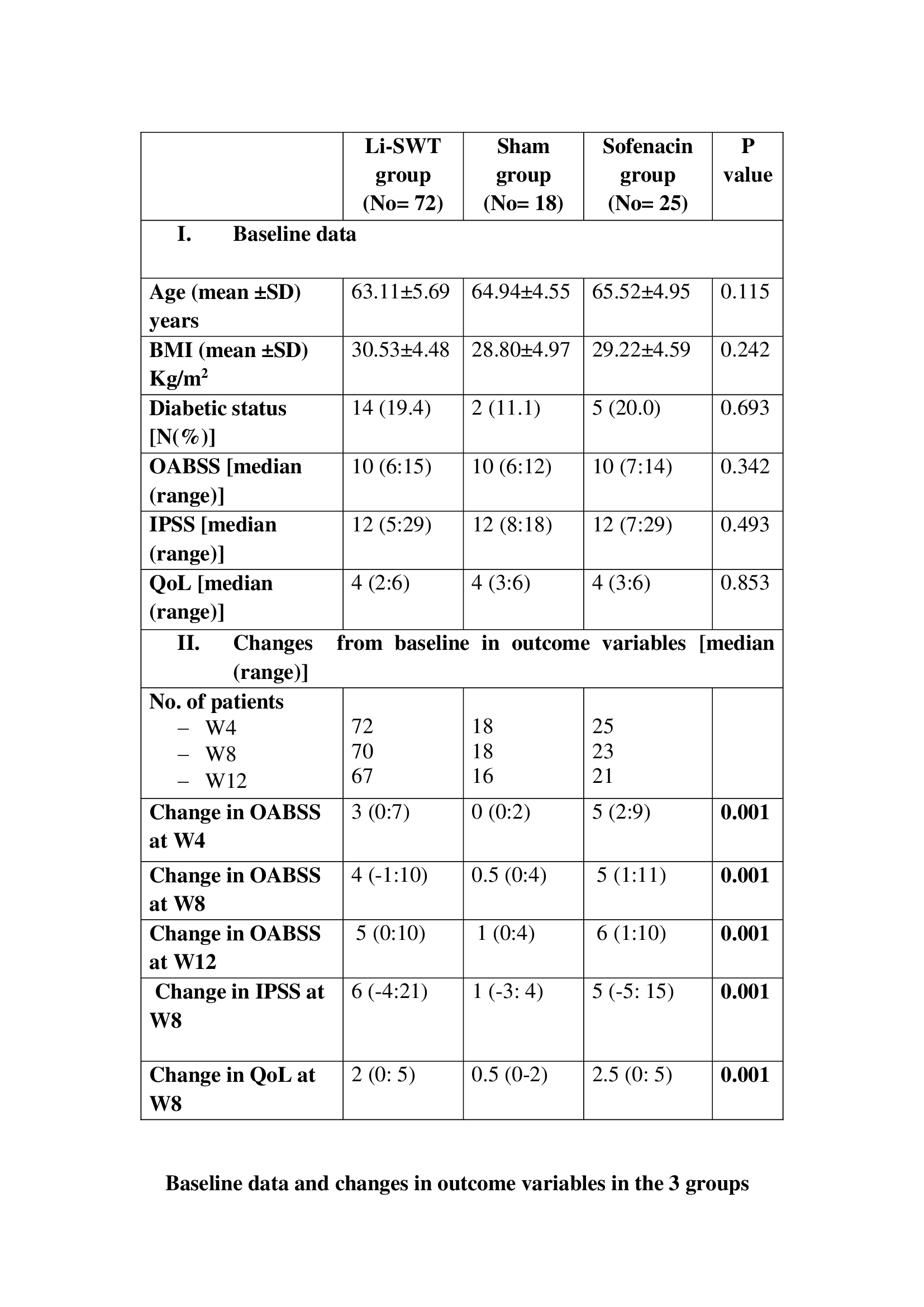Back
Poster, Podium & Video Sessions
Podium
PD38: Urodynamics/Lower Urinary Tract Dysfunction/Female Pelvic Medicine: Non-neurogenic Voiding Dysfunction II
PD38-08: Efficacy of low-intensity shock wave therapy on persistent storage symptoms after transurethral surgery for benign prostatic obstruction: Preliminary results of a randomized controlled trial
Sunday, May 15, 2022
8:10 AM – 8:20 AM
Location: Room 244
Mohammed Hegazy*, Khaled Zaky Sheir, Mohamed Ahmed Gaballah, Ahmed Mohamed Elshal, Mansoura, Egypt
- MH
Podium Presenter(s)
Introduction: We aimed to evaluate the efficacy of low-intensity shock wave therapy (Li-SWT) on persistent storage symptoms after transurethral surgery (TUS) for benign prostatic obstruction (BPO) in a randomized controlled study.
Methods: Patients with persistent storage symptoms for at least 3 months after TUS for BPO were eligible once they have urgency episodes/24 hrs = 1 and daytime frequency = 8. Patients were allocated to Li-SWT versus sham versus standard of care (solifenacin 10 mg once daily) in 3:1:1 ratio. Li-SWT was applied to suprapubic and perineal regions once-weekly for 8 weeks. The treatment efficacy was assessed by overactive bladder symptoms score (OABSS) at baseline, 4, 8 and 12 weeks as well as international index of prostate symptom score (IPSS), quality of life (QoL), uroflowmetry and post-void residual urine volume (PVR) at baseline and 8 weeks. Moreover, patient compliance and treatment-related adverse effects were evaluated. Visual analogue scale (VAS) ranging from 0-10 was used for pain evaluation during Li-SWT sessions.
Results: A total of 115 patients were enrolled (72, 18 and 25 patients in Li-SWT, sham and solifenacin group respectively). Baseline data were comparable between groups. OABSS at 4, 8 and 12 weeks as well as IPSS and QoL at 8 weeks showed significant improvement from the baseline level in Li-SWT and solifenacin groups compared to sham group (P=0.001). Solifenacin was associated with bothersome antimuscarinic adverse effects in 84% of the patients and it was intolerable in 9.5% of them. However, no adverse effects related to Li-SWT were noted apart from local pain during the procedure (mean VAS = 4.18 ± 1.31).
Conclusions: Li-SWT ameliorates persistent storage symptoms and promotes the QoL after TUS for BPO. It can be used as an alternative treatment to muscarinic receptor blockers with similar efficacy and without bothersome adverse effects.
Source of Funding: No source of funding

Methods: Patients with persistent storage symptoms for at least 3 months after TUS for BPO were eligible once they have urgency episodes/24 hrs = 1 and daytime frequency = 8. Patients were allocated to Li-SWT versus sham versus standard of care (solifenacin 10 mg once daily) in 3:1:1 ratio. Li-SWT was applied to suprapubic and perineal regions once-weekly for 8 weeks. The treatment efficacy was assessed by overactive bladder symptoms score (OABSS) at baseline, 4, 8 and 12 weeks as well as international index of prostate symptom score (IPSS), quality of life (QoL), uroflowmetry and post-void residual urine volume (PVR) at baseline and 8 weeks. Moreover, patient compliance and treatment-related adverse effects were evaluated. Visual analogue scale (VAS) ranging from 0-10 was used for pain evaluation during Li-SWT sessions.
Results: A total of 115 patients were enrolled (72, 18 and 25 patients in Li-SWT, sham and solifenacin group respectively). Baseline data were comparable between groups. OABSS at 4, 8 and 12 weeks as well as IPSS and QoL at 8 weeks showed significant improvement from the baseline level in Li-SWT and solifenacin groups compared to sham group (P=0.001). Solifenacin was associated with bothersome antimuscarinic adverse effects in 84% of the patients and it was intolerable in 9.5% of them. However, no adverse effects related to Li-SWT were noted apart from local pain during the procedure (mean VAS = 4.18 ± 1.31).
Conclusions: Li-SWT ameliorates persistent storage symptoms and promotes the QoL after TUS for BPO. It can be used as an alternative treatment to muscarinic receptor blockers with similar efficacy and without bothersome adverse effects.
Source of Funding: No source of funding


.jpg)
.jpg)